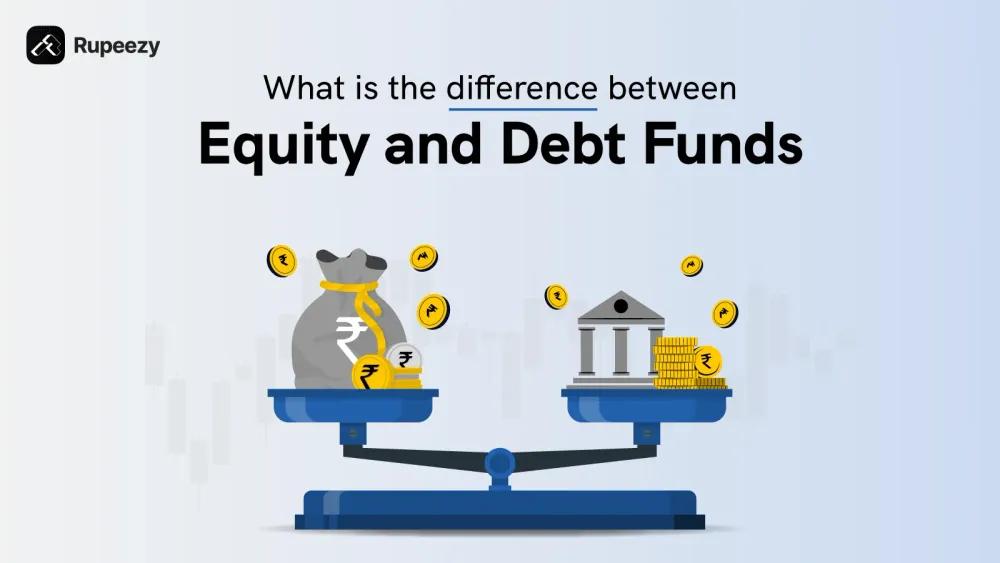Difference Between Equity and Debt Mutual Funds


00:00 / 00:00
Investing in funds is an excellent way to have your money grow. However, not all funds are the same. We have many different funds like equity, index, balanced, bonds, debts, mutual funds, etc. The most popular ones, though, are equity and debt funds.
As an investor, you need to know the difference between equity and debt funds. This is because each fund works differently and affects your returns in a different way, too.
Equity funds have the potential to give you high growth, but then, it is more risky. Debt funds, on the other hand, give you stability but with lower returns. When you know these differences, it helps you make better choices and build a diversified portfolio that fits the goals of your finances. Understanding both is important so as to balance risk and reward as you invest.
What is an Equity Fund?
An equity fund is a type of investment fund that pools your money with others to buy stocks, also known as equity securities. The focus of these funds is to invest in different stocks in order to generate returns. This makes them a crucial player in the financial market.
Equity funds are also called stock funds and give you a diversified approach to investing. With these approaches, there will be reduced risk in case one stock underperforms. Compared to debt funds, which are more stable, equity funds carry higher risk and the potential for higher returns in the long term.
What is a Debt Fund?
A debt fund is an investment in which the focus is on fixed-income assets, such as bonds, government securities, or money market instruments. The primary aspect of these funds is that they come with safety and stability as they invest in low-risk options. Thus, they make an ideal option if you are interested in gaining a steady income with less risk.
Compared to equity funds, debt funds are generally considered safer, especially in the context of the debt financing vs. equity financing debate. While the returns on debt funds are typically lower than those of equity funds, the predictability of these returns is what provides them with a sense of security.
Difference Between Debt and Equity Funds
Aspect | Equity funds | Debit funds |
Investment focus | Company stocks. | Bonds and fixed-income securities. |
Risk level | Higher risk due to market fluctuations. | Lower risk, but still not risk-free. |
Returns | Potential for higher returns in the long run. | More stable but generally lower returns. |
Time frame | Best for long-term (5+ years). | Suitable for short or medium-term (1-5 years). |
Taxation | Considered as Long-term gains with lower tax after one year. | Considered as Long-term gains taxed after three years |
Purpose | Mainly to grow wealth with high-risk, high-reward strategies. | To preserve capital with lower-risk investments. |
How to Invest and Key Considerations
How to Invest in Equity Funds
To invest in equity funds, you need to pass through several steps. Here's a guide to help you get started:
Define the goals of your investment: Know why you're investing (could be for retirement, education, wealth building, etc.) and make these align with your risk tolerance and time horizon.
Select the right fund type: Choose between active and passive funds, and determine whether you prefer a specific sector or geographic region.
Research potential funds: Check the prospect of the fund. Also, check its performance history, fees, and management style. You can compare funds using financial news platforms.
Open an investment account: You can do this with a brokerage firm or directly with the fund provider. Fund your account by transferring money from your bank.
Make your first investment: Choose the fund(s) you've researched and go on to purchase shares. Keep in mind that some funds have minimum investment requirements, which you have to meet. You can invest in equity funds through either a lump-sum payment or a systematic investment plan (SIP).
Monitor your investment: Review the performance of your equity fund on a regular basis. Rebalance your portfolio if necessary to ensure it aligns with your goals.
Tips Before Investing in Equity Funds
Understand the risks that come with the market: Be prepared for fluctuations in value since equity funds are subject to market volatility.
Diversify: Spread your investments across different sectors to reduce risk.
Consider the debt vs equity balance: Compare the likely returns of the equity funds to more secure and less risky options like debt funds. When you know the equity and debt difference, you can actually make a balanced portfolio.
Think long term: Equities give better results over the long run; hence, do not keep a short-term perspective.
How to Invest in Debt Funds
Investing in a debt fund is very straightforward:
Select a fund: Evaluate different debt funds in the market and focus on those with strong historical performance and low fees.
Open an account: Once you’ve selected a debt fund, you’ll need to open an investment account. You can do this through a platform like Rupeezy or any other financial institution that offers debt funds. Complete the Know Your Customer (KYC) requirements, which typically involve submitting identification documents and proof of address.
Invest: Decide how much you want to invest in your shortlisted fund, then buy units of the debt fund based on its NAV. You can choose to invest in the debt fund through lump-sum or SIP method.
Tips Before Investing in Debt Funds
Check returns: Look for funds that have had consistent returns over three, five, or ten years.
Watch fees: Choose debt funds that have low expense ratios in order to yield better net returns.
Read our latest blogs “Mutual Fund Houses in India“ and “How Mutual Funds Work” to learn more about mutual funds
Similarities Between Equity and Debt Funds
Below are some of the similarities between equity and debt funds:
Pooling of investments: Both equity and debt funds gather money from many investors to form a large pool of investments. They now use this pooled capital to invest in a diverse portfolio of assets. This collective fund helps spread the risk across different investments, reducing the impact of a poor-performing asset.
Professional management: Professional fund managers are the ones managing both equity and debt funds. These experts make investment decisions on behalf of the investors, aiming to optimize returns while managing risks in line with the fund's objectives.
Diversification: Both funds offer you diversification benefits. When you invest in a mix of assets like stocks for equity funds and bonds for debt funds they help lower the overall risk compared to investing in just one type of asset.
Equity vs Debt: Which is Better for You?
Make up your mind with regard to the equity vs debt funds after thinking through your objective and risk tolerance. Equities will give you higher returns, but then it's risky because of the market being volatile. It is best for you if you are a long-term investor and have growth perspectives.
On the other hand, debt funds offer stability but with less return. So, they are ideally suited if you are the kind of investor who is conservative and gives precedence to safety above high returns.
Those who favor aggressive growth can opt for equity funds, and those who rely on steady income with lesser risk can go with debt funds. Whether to opt for debt vs equity depends on the fact that you need higher potential returns with risk or stable returns with less risk. Whichever option you go with, the aim, of course, is to ensure it helps you meet your financial goals within your investment timeframe.
Use our latest SIP calculator, step-up SIP calculator, and mutual fund calculator to calculate your equity or debt fund returns and investment growth.
Conclusion
In the end, the choice between equity and debt funds depends on your financial goals. Equity funds are for you if you want higher returns but with more risk. Go for a debt fund if you require stability but with lower returns.
Are you ready to take the next step? Rupeezy gives you a range of investment options that are made for just what you need. Download the Rupeezy app to explore and make the best choice for your financial future.
The content on this blog is for educational purposes only and should not be considered investment advice. While we strive for accuracy, some information may contain errors or delays in updates.
Mentions of stocks or investment products are solely for informational purposes and do not constitute recommendations. Investors should conduct their own research before making any decisions.
Investing in financial markets are subject to market risks, and past performance does not guarantee future results. It is advisable to consult a qualified financial professional, review official documents, and verify information independently before making investment decisions.

All Category









